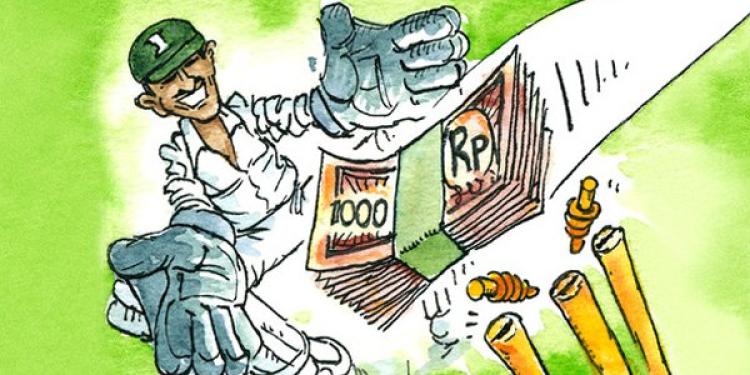The Cricket Controversy: Untangling One of the Most Complex Corruption Cases
Posted: May 27, 2014
Updated: October 4, 2017

Sports fraud is a hot topic these days – especially in the world of cricket – as more details about an international corruption ring surface.
All eyes are on international cricket’s Anti-Corruption and Security Unit (ACSU), as recent gambling news reveal shocking information about the investigations conducted by the unit, as well as the people involved.
A phone conversation between an anti-corruption official and an Indian man suspected of being a bookmaker has been leaked. The discussion was broadcasted on a TV channel in Bangladesh, as well as on YouTube.
Now the media is trying to decode its meaning and it looks like getting to the bottom of the recent corruption cases in cricket is more difficult than anyone would have expected.
Phone call sparks controversy
Cricketers banned for match-fixing
Over the years, the “gentleman’s game” has seen a lot of match fixing scandals. Here’s a list of players who were banned for being involved in them:
• Hansie Cronje
• Mohammad Azharuddin
• Manoj Prabhakar
• Herschelle Gibbs
• Henry Williams
The two people involved in the aforementioned phone conversation were Dharamveer Singh Yadav, who works for ACSU, and Atanu Dutta. Calling from inside a stadium, during the recent World Twenty20, the latter was asking Yadav to help him leave, adding that he fears he may have been spotted.
While giving him instruction to leave the stadium, Yadav is heard telling Dutta to “be careful this time”. “Last time I faced some problems because of this,” he said.
This odd conversation has led the media to believe that the anti-corruption official was somehow helping out a person who was faced several sports fraud charges. It was later revealed that Dutta may in fact be an informer working for Yadav, who is based in India.
Over the past two months, Dutta was arrested three times in Bangladesh, only to be released shortly after. On March 21, after being caught at the Sher-e-Bangla stadium in Mirpur during the India-Pakistan match, Yadav reportedly confirmed that he was an informer, asking the police to let him go.
Prostitutes used to blackmail players
It’s becoming clear that the corruption in cricket runs deeper than investigators expected. The British paper Telegraph recently accessed some confidential ACSU documents which prove that bookies tried to contact players during the 2011 World Cup and the 2009 World Twenty20 in England.
Detectives found out that several Indian bookies were involved. Apart from approaching players, one of them also traveled to the United Arab Emirates, where he tried to fix a Test series between Pakistan and Sri Lanka.
The report reveals that gambling operators have been using some very sneaky methods to try and influence online and mobile betting results. Investigators suspect that one bookmaker partnered up with a woman who tried to charm and blackmail a cricket player into fixing matches during the World T20 in 2009 and the 2011 World Cup.
Other sports betting shop owners tried to offer players casino chips and promised to pay for call girls and a “safe hotel room”. Prominent Indian bookie JS contacted the brother of a player and offered $96,000 to talk him into spot fixing a Test series.
“In total the ACSU chased 281 lines of inquiry across the world, investigated 11 corrupt approaches to players or team officials, 124 suspicious actions, monitored the suspicious activities of 67 individuals, sifted through 74 pieces of technical data and worked through five other pieces of information related to fixing,” the Telegraph reported.
Reforming the anti-corruption team
The ACSU is under intense scrutiny and it is said that the boards of Australia, England and India want to carry out a reform, to award more power to individual boards. There has been much speculation about what prompted this decision.
Some believe it’s because of friction between Narayanaswami Srinivasan, former president of the Board of Control for Cricket in India, and ACSU head Yogesh Pratap Singh; others believe it’s due to concerns that investigators and their methods are outdated.
The ACSU is having enough trouble as it is, trying to figure out the names of everyone involved as these cases of corruption run deeper and deeper. A reform could end up postponing the results of the investigation even more, so it looks like it will be a long time before the corrupt bookmakers pay for their deeds.












